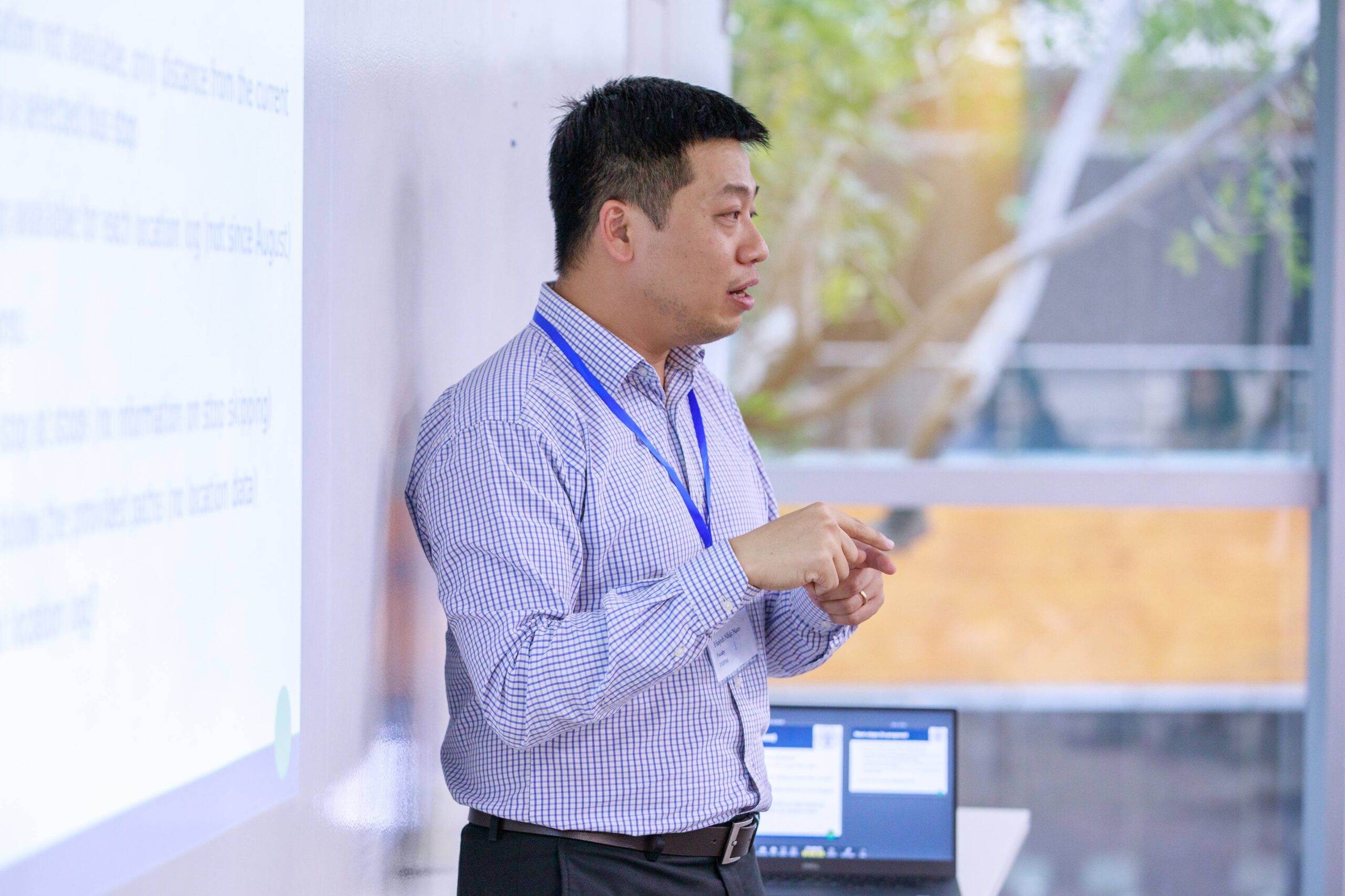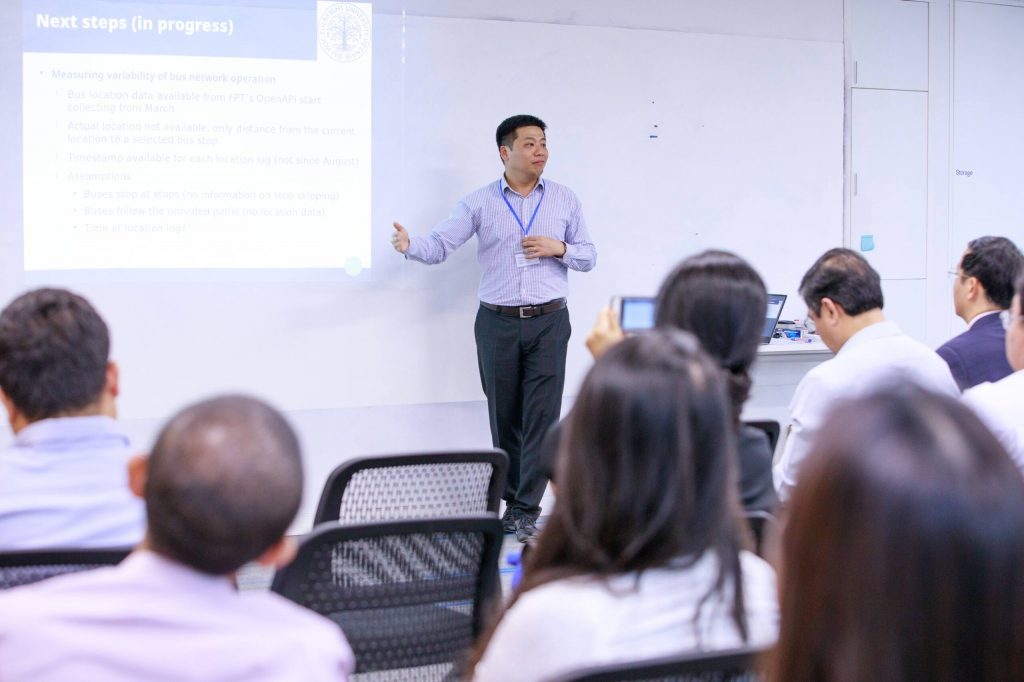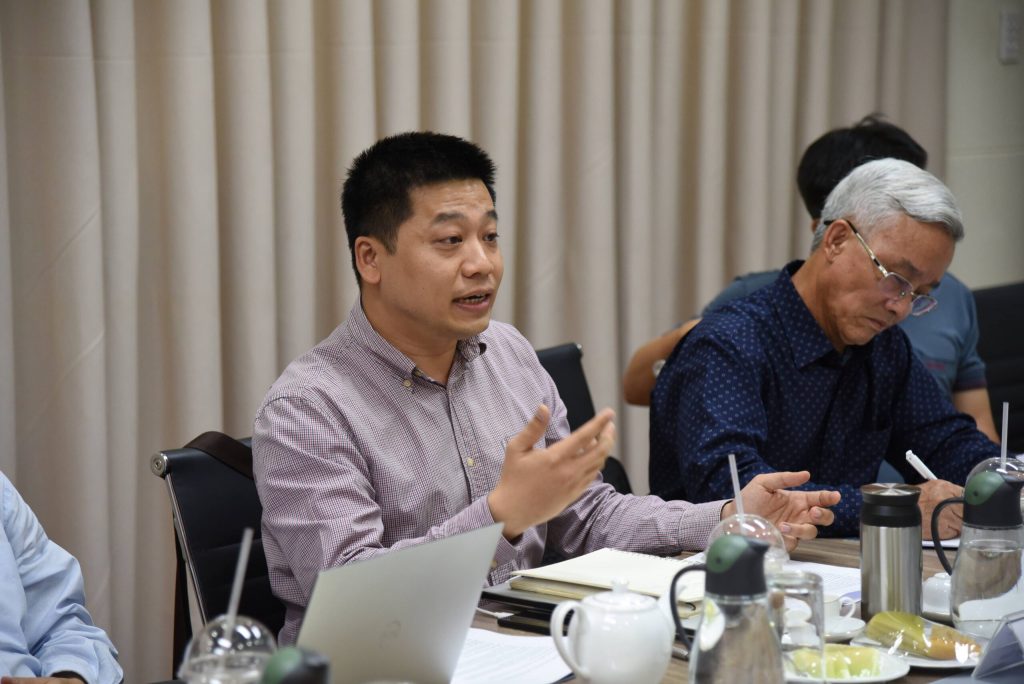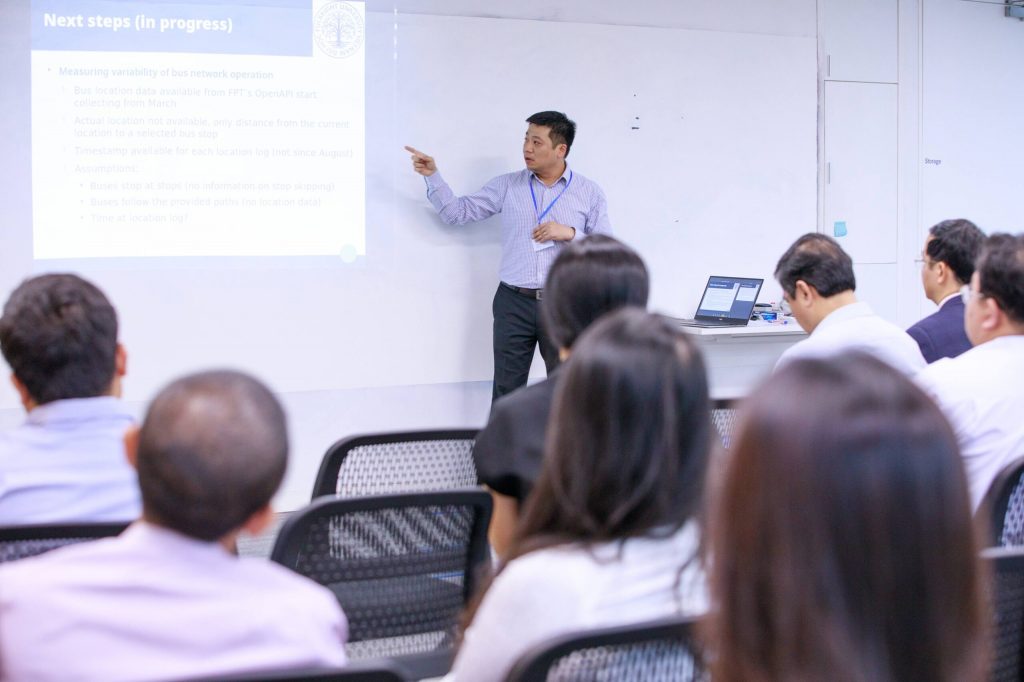
At the end of 2018, Dr. Huynh Nhat Nam decided to resign from his position at the New South Wales Department of Transport (Australia) to return to Vietnam. This career change led him to become a researcher and lecturer at the Fulbright School of Public Policy and Management (FSPPM).
In Ho Chi Minh city late 2018, Dr. Huynh Nhat Nam had a talk with Dr. Vu Thanh Tu Anh, Director of the Fulbright School of Public Policy and Management. The conversation opened up so many ideas that Dr. Huynh Nhat Nam quickly decided that he would develop Big data studies at Fulbright even though around this time, data science and big data were completely new at the Fulbright School.
Graduated from Ho Chi Minh City University of Technology with a bachelor’s degree in aeronautical engineering, Mr. Nam pursued a Master’s degree in Robotics and did a PhD in Materials Engineering at the University of Wollongong (Australia). He began working with data science and Big data when the University of Wollongong established the SMART Infrastructure Facility. At this consulting institute, Mr. Nam was the founder and leader of the Infrastructure Simulation and Modeling research team. His team extensively collaborated with various departments in the New South Wales state government and universities in Australia, undertaking many data analysis projects on railway logistics, population and demographics forecasting, urban traffic demand, and road traffic emissions.
With such a background, he moved on to work at the New South Wales Department of Transport, where he oversaw and engaged in the development of strategic traffic simulation models that assisted the planning of public transportation for the Greater Sydney area. During his 10 years working in Australia, he accumulated research experience and built a network with Australian universities and the Australian government to implement government- and private-funded data analysis projects as well as simulation models of urban infrastructure systems.
Catching up on the new trend
Dr. Tu Anh’s request for Dr. Nam was to research and propose policy-relevant big data research programs at Fulbright. In the process of expanding the Fulbright School’s network when it joins the 300-member NASPAA (America’s Global Network of Schools of Public Policy, Public Administration and Public Administration), at regional conferences, Dr. Tu Anh quickly noticed an emerging trend.
That is, Big data is being applied more and more diversely in the fields of finance, investment, commerce, and services. Applying data science and Big data to solve strenuous problems and improve public service experiences is a research focus that leading public policy schools around the world are promoting. As a strong advocate of innovation in training programs, Dr. Tu Anh, as the leader of development strategy of FSPPM, considered teaching and researching the applications of big data as an inevitable direction.

From the request of Dr. Tu Anh, Dr. Huynh Nhat Nam began a research project about urban traffic. The project, titled “Building Big data infrastructure for urban areas – Calculating the connectivity, resilience, and the needs of the bus network in Ho Chi Minh City,” was submitted by the Fulbright School of Public Policy and Management for a grant from the Vingroup Innovation Fund in March 2019. In July, Vingroup Innovation Fund approved the grant application and in August 2019, Dr. Huynh Nhat Nam started leading the implementation. Remarkably, this topic made it to the top 20 most feasible projects, making Fulbright School the only applicant not operating in the field of science and technology to receive funding. This is also the Fulbright School’s first Big data research project led by Dr. Huynh Nhat Nam as a Senior Researcher.
The idea for this research came from observations in the media that buses in Ho Chi Minh city are frequently delayed. They often skipped their stops or even canceled their scheduled rides. However, there was very little empirical data showing the specific reasons behind this phenomenon or the bottlenecks and peak times where missed stops and delays occur most frequently. To find a solution to this problem, Dr. Huynh Nhat Nam exploited data on the real locations of public buses operating in Ho Chi Minh city everyday in order to not only quantify problems in the operation of the public bus network, but also to set the premises for simulation models that will improve the stability in operation of the bus network. However, the most significant value of this project was to provide a scalable data analysis model that is applicable to the future operation of metro lines, allowing for the efficient design and analysis of the connectivity of the entire multimodal public transportation network of Ho Chi Minh City.
This inaugural project also began to lead Dr. Huynh Nhat Nam to expand his exploration of the potential of data science and its applications in Vietnam, which are not limited in just the academic research sphere.
At the end of March this year, Dr. Huynh Nhat Nam, together with economists and researchers from FSPPM, went to Can Tho province to attend a technical meeting of the content development team of the 2021 Mekong Delta Annual Economic Report. This is the second time the Fulbright School of Public Policy and Management collaborated with a group of leading economic and policy experts in Vietnam to produce this report, in which the FSPPM was primarily responsible for the scientific component. The objective of the report is to provide scientific support for the central government to identify the strengths, weaknesses, opportunities, and challenges of the Mekong Delta, thereby defining clear strategic priorities and implementation processes for planning of the Mekong Delta in the next 10 years. This is the basis to assess the integrated planning of the Mekong Delta until 2030 with a vision to 2050, including the agricultural transformation model for the region and the development of transport infrastructure associated with the agricultural transformation.
Participating in this local research project brought Dr. Nam an idea about making an internal waterway traffic map for the Mekong Delta, with features similar to those of Google Maps on land. Based on Artificial Intelligence of Things technologies and network analysis techniques applied in traffic, Dr. Nam and his colleagues at the University of Wollongong, Australia, proposed to build a scalable, reliable, and cost-effective digital system for monitoring and recording vessel movement data.
This system will allow the development of two main products. One is a web portal for visualization of ship positions, vessel tracking, and estimated near-real time water traffic density (similar to the features of global ship tracking websites like marinetraffic.com). Through publicly accessible and interactive visualization of water traffic density, this portal will contribute greatly to improving the safety and efficiency of domestic waterway transportation in the Mekong Delta. The other product is a database of historical data on vessel operations on the waterway network, which will be very useful for future research and planning to improve the resilience of the inland waterway logistics network in the Delta region. Such database does not only serve the purpose of daily travel, but it also helps analyze the socio-economic development characteristics of the region.

As the region with the most abundant network of rivers and canals in Vietnam, the Mekong Delta has long been considered a place with great potential for inland waterway transport (IWT). However, according to the 2020 Mekong Delta Annual Report, the inland waterway logistics network is only used on a small scale, mainly to gather local products before they are transported on roads to seaports in Ho Chi Minh City and Tan Cang – Cai Mep Thi Vai (CMTV) in Ba Ria Vung Tau.
“The sustained lack of investment in upgrading the waterway infrastructure has been widely reported as the main cause of this problem. However, an equally important but less reported fact is that the Mekong Delta does not have a comprehensive and high quality database on the past performance of the waterway network. This hinders a systematic approach to identify bottlenecks in the region’s waterway system and to plan the establishment of a flexible and efficient multimodal logistics network,” Dr. Nam remarked.
The Sherlock Holmes of data
The biggest challenge in researching and analyzing data of policy or practical issues in Vietnam is that it is extremely difficult to access data and the data is not well-structured or of good quality. Dr. Huynh Nhat Nam joked that the role of a researcher like him is no different from Detective Sherlock Holmes, whose investigation brings a full range of emotions: happiness, anger, love, hate, and thrills.
“In fact, even in developed countries like Australia, layers of data are not freely available. But they are willing to share the data when they understand the value of it. The data is only useful when it helps us derive insights that inform critical decisions. The value of the data depends on the value of those decisions. So it goes back to the core problem: before we begin data analysis, we must define the questions, the problems, and the challenges. Data analysis is about extracting useful information beyond the numbers, telling a story, reflecting on a problem, and suggesting appropriate directions to find answers,” according to Dr. Nam.
On another note, Dr. Nam also sees the private sector as a driving force in the development of Big data in Vietnam today, especially the business sector which is actively approaching and heavily investing in the data segment. Data will be the foundation for development strategies as well as competition advantages of the enterprises. Currently, Dr. Nam is accelerating the establishment of a group of experts in data science and big data in Vietnam who will be able to embark on research and provide support to the private sector to effectively exploit the values that data has to offer.

Along with researching and proposing policy-relevant big data research programs, Dr. Huynh Nhat Nam is responsible for developing the curriculum in data science and big data at Fulbright. FSPPM’s Master’s programs have a foundation in economics, so the application of data science and big data is highly important.
“Data science always comes hand-in-hand with a certain field and there can be no generic data science. It must be tied to either finance, logistics, transportation, or marketing in order for the data to be valuable and to help solve a particular problem. That’s human-centered data science, and this is the branch of my approach to building training programs at Fulbright. Although the data curriculum is very technical, our teaching is based on experience through real-life situations and has useful implications for learners,” said Mr. Nam.
In addition to research and teaching at FSPPM’s Master of Public Policy program, Dr. Huynh Nhat Nam also participates in teaching activities in the pedagogical ecosystem at Fulbright University Vietnam. In the near future, he will be the lead faculty of the second seminar at YSEALI Academy. The seminar is for young leaders from 10 ASEAN countries and Timor-Leste. Dr. Huynh Nhat Nam will lead a course on the Opportunities and Challenges of Digital Transformation in the Post-Covid-19 era.
After more than two years back in Vietnam, Dr. Huynh Nhat Nam is having so many new ideas for his work.
“Sometimes, I would think if I had stayed in Australia, I wouldn’t have been able to do what I’m doing in Vietnam. In my heart, I have always wanted to develop projects like the ones I’m doing but I did not have the opportunity to do in Australia. Data science and big data in Vietnam are just beginning to grow. It has been a precious opportunity for me to apply my expertise,” he said.
Xuan Linh









